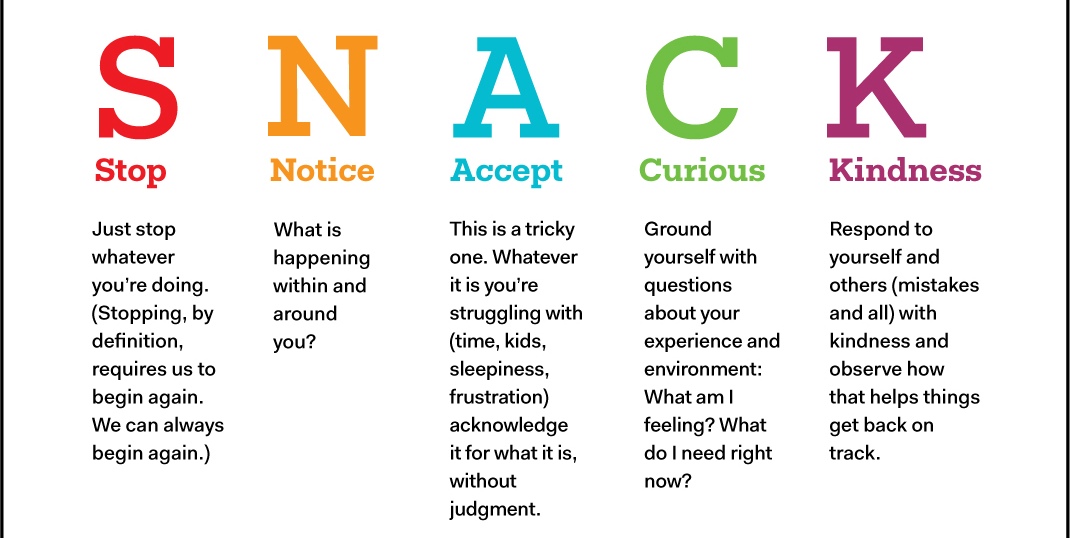Mindfulness has been trendy for a while, but it’s a bit more than just a fad!
The NHS have approved its use with a variety of mental health difficulties. Most often prescribed for use with recurrent depression, frequently cited as helpful with anxiety, some studies show it helps with managing chronic pain; so if these are things you struggle with, it’s probably worth a go.
What is Mindfulness?
Originating as a non-religious version of buddhist meditation, mindfulness is a mental state achieved by focusing one’s awareness on the present moment, while calmly acknowledging and accepting one’s feelings, thoughts, and bodily sensations.
What does that actually mean in the real world?
NOTICE
Firstly, to be mindful is to notice what you’re experiencing. It might be that you notice how your body feels (i.e. tiredness), or what thoughts are racing through your head (i.e. worries about tomorrow). It might be that you feel some emotions (i.e. sadness) or you might notice an urge to do something (i.e. stand up and leave the room). You can also be mindful about what you can sense, like the sounds, smells, sights, tastes, temperatures and textures around you. Often mindfulness meditations will ask you to notice your breath, as that is one things which is always present.
ACCEPT
Secondly, if you’ve noticed something, then you accept it for what it is and try not to change it or judge it. For example, you might notice that your heart is beating quickly. Rather than judging it as ‘unhealthy’ or taking deeper breaths to try to control it, you would simply observe it and perhaps you might be curious about it, but that is all.
GUIDE BACK
Thirdly, if your brain does wander off into the content of some of your worries, or if your brain starts to judge some of the things you’ve noticed, then there’s no need to berate yourself. Gently, kindly, calmly, mindfully, choose to direct your concentration or attention back to the present moment. Often this is most easily done by re-focussing on the breath or your body.
The process is summarised by the acronym SNACK:

Sounds straightforward, so how do I learn?
It is straight forward but although it’s logical, mindfulness is a skill that needs to be learnt. For years our brains have been focussing on the past and the future and not the present; so you have to learn to be mindful.
Mindfulness is often taught in classes by mindfulness teachers who guide you through a mindful meditation. More and more, now, it is taught via CDs, YouTube and apps. Below I’ve listed some great resources but importantly, I’ve listed the Top 5 mindfulness apps 2018, as tested by me.
Once you’ve learnt the basic principles, you can then practice mindfulness wherever you are and at whatever time you choose.
Where do I find Mindfulness courses near me?
There are often plenty of free taster courses available in your local area, most classes will allow you to go along for the first class to see if it’s for you.
Some NHS services in your area provide free classes; to find a service, type in your location in this link.
MeetUp also provides links to Mindfulness courses in your area, some of which are free. You have to register first, but that’s free and then you can find every type of course, not just mindfulness.
The Top 5, Best Mindfulness Apps 2018
1. Headspace (click here for: Android / iOS)
This app is free upfront but for access to more material it’ll cost ya. The cheapest way to access the full version is to become a member of Anxiety UK (click here) for £30 and you get free Headspace access (which normally costs £70 a year)
2. Mindfulness Daily (iOS)
Free and simple. Great for beginners and has short sessions of 5 minutes but 21 different tracks so you won’t get bored.
3. Smiling Mind (click here for: Android / iOS )
This app is free and perhaps best for a wide range of ages, it has mindfulness tracks for children too, as well as adults
4. Insight Timer (Android / iOS)
This is free and has the most content. There isn’t just mindfulness on here so you’ll have to search around but there’s plenty to get going with and a lot for the more experienced mindfulness-er
5. 10% Happier (Android / iOS)
Free for the first bit and then you pay. Best for the sceptics, the busy people and those who don’t think mindfulness work on them in a million years.This app doesn’t just have mindfulness exercices, it has other techniques too but it’s put across in a no-nonsense way.
Best Mindfulness Website with free mindfulness audio tracks and resources
These sites have free audios for you to listen to online or download. Some of them also add and update their resources regularly so you’ll never run out!
Free Mindfulness (click here)
Frantic World (click here)
Mindful.org (click here)
Best Mindfulness book
Mindfulness: A Practical Guide to Finding Peace in a Frantic World by Mark Williams and Danny Penman (click here)
This seems to be a best seller, time and time again. It comes with a free CD too.
Best Mindfulness CD
Guided Mindfulness Meditation Audio CD by Jon Kabat-Zinn (click here)
This guy is the father of mindfulness so you’re in safe hands.
Anna Batho is a qualified Senior Psychological Wellbeing Practitioner, Trainee Clinical Psychologist working for the NHS and private therapist working in London and based in Stoke Newington, Dalston and Hackney.


Comments are closed.